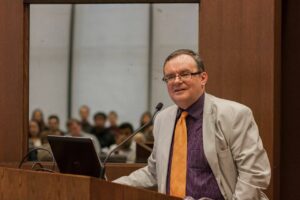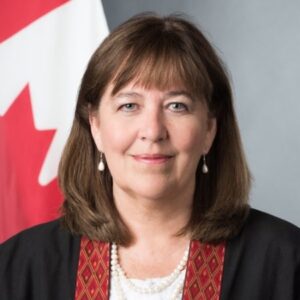TRN409H1
TRN409H1: Selected Topics in International Studies
These fourth-year seminars introduce students to advanced study of international relations focused on specific themes as determined by the course instructor. For the 2022-2023 academic year, there are five sections of TRN409H1.
TRN409H1-F: LEC0101: Selected Topics in International Studies – Canadian Defence Policy since the Cold War
Course Description
This course covers the evolution of Canadian defence policy since the close of the Cold War in the late 1980s. It addresses the efforts of successive governments to adjust to the changed post-Cold War security environment. Early sessions will cover the Cold War legacy and efforts to adapt such practices as peacekeeping to new circumstances. Later sessions will cover such challenges as Ballistic Missile Defence, reforming defence procurement, the mission in Afghanistan, and current threats to European security.
2023-2024 Course Instructor
|
Jack Cunningham Jack Cunningham is a Fellow and Assistant Professor at Trinity College, where he is Program Coordinator of the Bill Graham Centre for Contemporary International History and teaches in the International Relations Program. He holds a BA in English and an MA in History from the University of Calgary, and a PhD in History from the University of Toronto. He has published on the recent conflict in Afghanistan, the 2003 invasion of Iraq, and Canadian nuclear history, among other topics. He is a former editor of International Journal, Canada’s principal journal of foreign affairs. |
 |
TRN409H1-F: LEC0201: Selected Topics in International Studies – Foundations of Canadian Foreign Policy
This course is a mixture of three elements: a review of the history of Canada’s external
relations policies since the Second World War; an examination of international relations,
with Canada as a case study; and a discussion of the dynamics of Canadian diplomacy.
The course is organized to look at some of the most fundamental aspects of Canadian
foreign policy, and to examine why those themes became anchored in the way
Canadian diplomacy has been carried out, under both Liberal and Conservative
governments since 1945.
2023-2024 Course Instructor
| Daniel Livermore Daniel Livermore was a foreign service officer and specialist in international affairs for more than three decades. In 2007 he became a Senior Fellow at the University of Ottawa’s Graduate School of Public and International Affairs, and from 2008 to 2016, he was a senior mentor in the National Security Program of the Canadian Forces College in Toronto, Ontario. In 2016, he became a Senior Visiting Fellow at the Bill Graham Centre for Contemporary International History at Trinity College, University of Toronto. In 2018, he published a book, “Detained: Islamic Fundamentalist Extremism and the War on Terror in Canada.”, and in 2020 he published “Wandering Willie: the Memoirs of William McDougall 1822-1905, Canada’s Forgotten Father of Confederation.” |
 |
TRN409H1-F: LEC0301: Selected Topics in International Studies – Infectious Disease, Security and Society
Course Description
International relations scholars have long considered the challenges of decision making under uncertainty, particularly in response to acute crises. Infectious diseases pose one such set of challenges whether it be managing endemic disease or the prevention and management of epidemics and pandemics. To some, infectious diseases pose a risk to national security through the erosion of state capacity and stability, biosecurity and decisions around the procurement of bioweapons. To others, infectious diseases evoke matters of human rights and social justice when considering the distribution of disease and access to care. At the centre lay approaches rooted in human security that bring together the stability and protection of our national borders with the responsibility of all governments to protect the most vulnerable in our midst. Such complex and interconnected crises place high demands on intelligence, defense, public health and development agencies at the national and international level.
While such crises reveal vulnerabilities in our governing institutions, they also reveal the possibilities for positive policy change. This course unpacks why—identifying what we know about crisis prevention and management and the relationship between security, intelligence, human rights and health. It does so by drawing upon the rich literature of conflict management and crisis decision making, public health, medical anthropology, security and intelligence analysis, situating the responses to recent infectious disease outbreaks. In particular, we will focus on how policy standards are negotiated and how health and security are defined and evaluated, drawing out lessons for future crises.
2023-2024 Course Instructor
|
Joy Fitzgibbon Joy Fitzgibbon received her PhD from the University of Toronto. She currently serves as Assistant Professor and Associate Director of the Margaret MacMillan Trinity One Program at Trinity College and is a Fellow of College. Joy’s research considers the ways in which we respond more effectively and compassionately to human suffering in the hardest of places, focusing on solutions to governance dilemmas in global health policy and on violence against women in conflict zones. In the Trinity One program, she is exploring new modalities of pedagogy that enable us to learn, live and serve our communities in integrated and sustainable ways. A recipient of a joint Social Sciences and Humanities Research Council of Canada/ Canada Health Services Research Foundation Grant for her doctoral research on Harvard’s Partners in Health and its policy advocacy at the World Health Organization, she is also the co-author of Networks of Knowledge (University of Toronto Press) with Janice Stein, Richard Stren and Melissa MacLean. She has served as a governance and policy advisor on the board of Food for the Hungry Canada, lectured as faculty in the International Paediatric Emergency Medicine Elective and in the Canadian Disaster and Humanitarian Response Training Program and submitted policy reports the then Canadian Centre for Arms Control and Disarmament and the Canadian International Development Agency (with Janice Stein). She served on the University of Toronto’s Academic Board, and currently serves at Trinity College on the Senate, as Chair of the Senior Common Room and is a Senior Fellow at the Bill Graham Centre for Contemporary International History. |
 |
TRN409H1-S: LEC0101: Selected Topics in International Studies – Nuclear Weapons and International Politics
Course Description
This course covers the impact of nuclear weapons on international politics from Hiroshima to the present. We will cover the evolution of the weapons themselves, the development of nuclear strategy, and of efforts at arms control and disarmament pertaining to nuclear weapons. We will also pay attention to the emergence of antinuclear movements, perceptions of nuclear weapons in popular culture, and decisions by various states to acquire nuclear weapons (or not).
2023-2024 Course Instructor
|
Jack Cunningham Jack Cunningham is a Fellow and Assistant Professor at Trinity College, where he is Program Coordinator of the Bill Graham Centre for Contemporary International History and teaches in the International Relations Program. He holds a BA in English and an MA in History from the University of Calgary, and a PhD in History from the University of Toronto. He has published on the recent conflict in Afghanistan, the 2003 invasion of Iraq, and Canadian nuclear history, among other topics. He is a former editor of International Journal, Canada’s principal journal of foreign affairs. |
 |
TRN409H1-S: LEC0201: Selected Topics in International Studies – Canada and Asia in Revolution, 1945 to Present Time
Course Description
This course examines the fascinating history of Canada’s relations with Asia since 1945. Together we will explore key themes regarding diplomacy, trade, human rights, development and immigration during a period of great political, economic and social change. While the main focus will be on official relations, we also will consider the role of business, military, cultural and other non-state actors. Course readings include scholarly books and articles as well as biographies, memoirs and primary documents. Since this is a seminar course, students will be assessed on their participation, presentations and written work. They will be expected to engage intelligently and critically with the course material, thereby deepening their understanding of Canada’s role in this increasingly important region.
2023-2024 Course Instructor
|
John Meehan Professor John Meehan is the Director of the Bill Graham Centre for Contemporary International History at Trinity College. A historian by training, Dr. John Meehan has a BA in History and Russian Studies from McGill University, a diploma in Theology from Magdalen College, Oxford, an MA in International Relations from the School of Advanced International Studies (SAIS) at Johns Hopkins University and a PhD in History from the University of Toronto. His publications include The Dominion and the Rising Sun: Canada Encounters Japan, 1929-1941 (winner of the Prime Minister’s Award in Japan) and Chasing the Dragon in Shanghai: Canada’s Early Relations with China, 1858-1952. A former President of Campion College (U of Regina) and the University of Sudbury, he has taught and published on Canadian foreign relations, Asia Pacific studies and relations with Indigenous peoples. |
 |
TRN409H1-S: LEC0301: Selected Topics in International Studies – Multilateralism and Global Diplomacy
Course Description
In this course we explore the multilateral system through a range of challenging policy issues such as disarmament, climate change, global health, justice and accountability, trade and other issues with guest diplomats who have led and continue to lead the negotiations. Are the institutions of multilateralism and global governance that were created in a different historical time and context still fit for purpose? Are the rules, norms and practices of the institutions still essential and still practical? Students will develop skills in policy advocacy and deepen their understanding of diplomacy in a global context.
2023-2024 Course Instructor
|
Rosemary McCarney Rosemary McCarney BA, LLB, MBA, is the James Coutts Visiting Scholar in International Relations at Trinity College and the Diplomat in Residence at Massey College. She is the past Ambassador of Canada to the United Nations in Geneva and to the Conference on Disarmament. Her career spans every sector of the economy from high tech to not for profit. She has lived and worked in over 100 countries. She has taught law and international relations in the US and Canada and is an award-winning children’s book author. |
 |
TRN409H1-S: LEC0401: Selected Topics in International Studies – Global Health Security Policy
Course Description
Policy formation is a key part of global health. Although the COVID-19 pandemic is not without historical context, policy formation to protect, prevent and prepare in this pandemic continues to challenge national governments as well as multilateral institutions. Policy making in crises, especially a still unfolding and unpredictable one such as this pandemic, offers important lessons for students and scholars of international relations. COVID-19 has unmasked vulnerabilities and weaknesses in our global governance systems and in leadership. It has made clear major failings in social consensus and equity. It has resurfaced tensions in state sovereignty and nationalism. Who gets to make health policy that impacts billions of lives and knows no borders? Is global health a global public good? What are the new institutions needed to make this the last pandemic? How do we sort human rights and public health mandates? How does scientific evidence recover in a world of disinformation and misinformation? 2022-2023 will offer a real time lens on these questions and the global solutions being negotiated.
2023-2024 Course Instructor
|
Rosemary McCarney Rosemary McCarney BA, LLB, MBA, is the James Coutts Visiting Scholar in International Relations at Trinity College and the Diplomat in Residence at Massey College. She is the past Ambassador of Canada to the United Nations in Geneva and to the Conference on Disarmament. Her career spans every sector of the economy from high tech to not for profit. She has lived and worked in over 100 countries. She has taught law and international relations in the US and Canada and is an award-winning children’s book author. |
 |